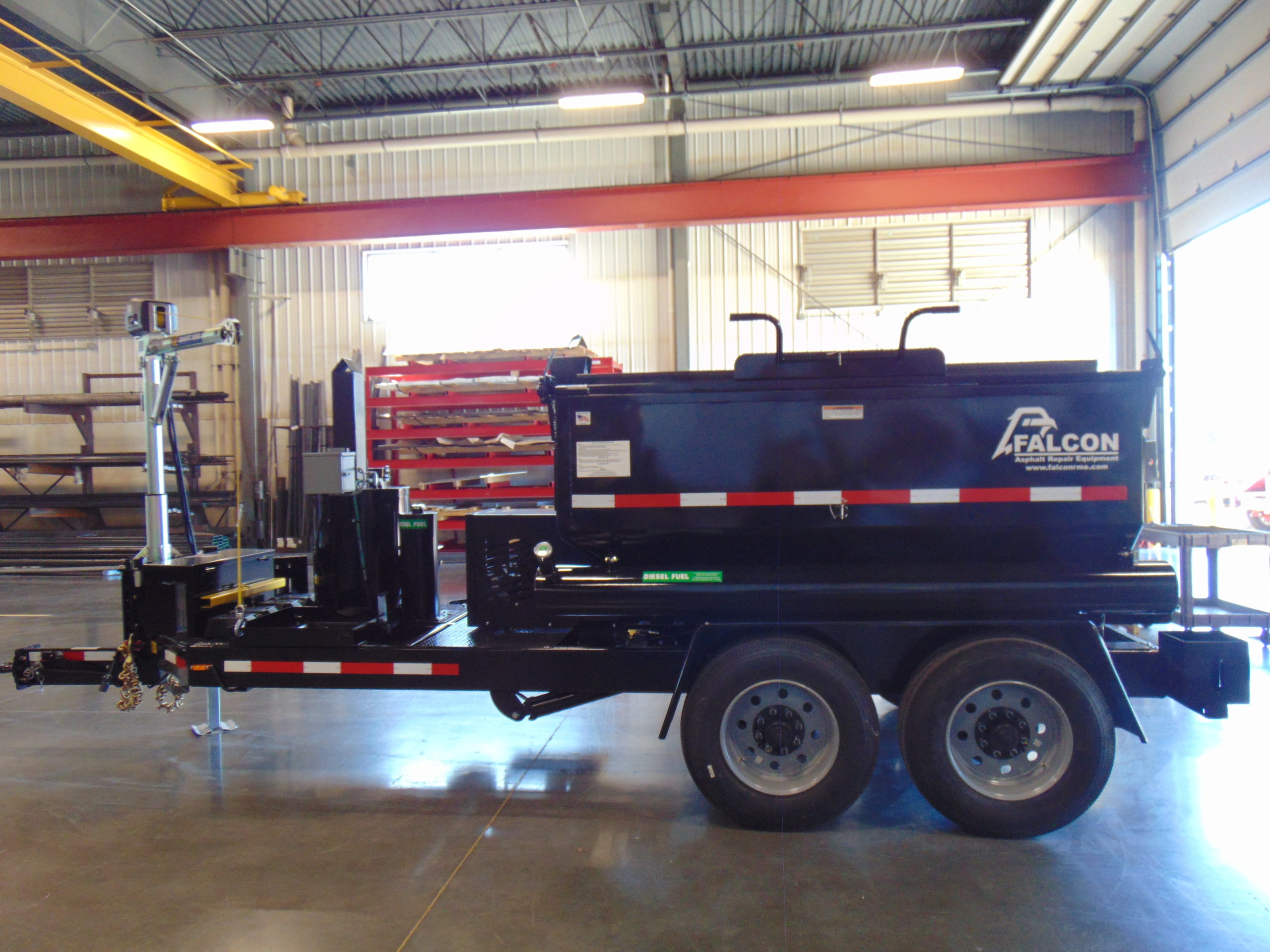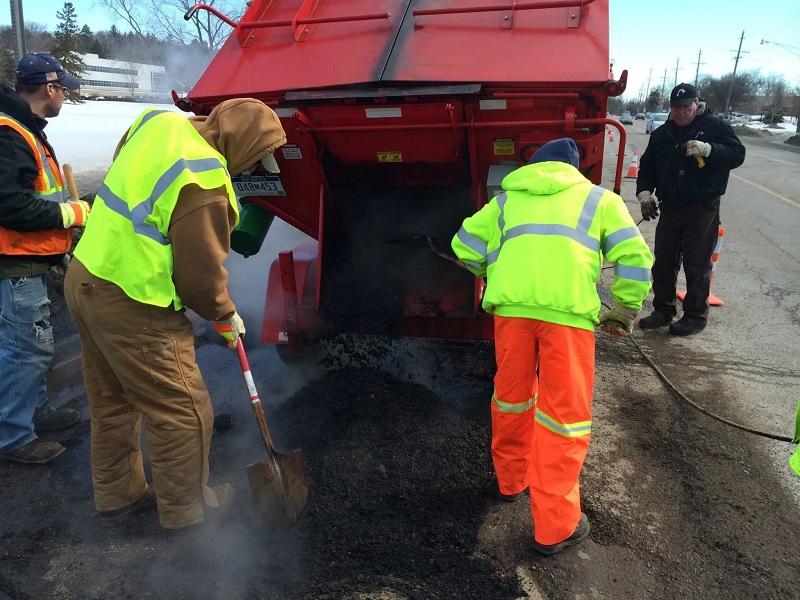Efficiently repairing potholes presents an ongoing challenge for many municipalities and contractors tasked with road repair. Using the right repair equipment can help transform a seemingly continuous uphill battle into a streamlined operation.
Hot boxes and patch trucks are two primary equipment options that each offer their own unique advantages. But how do you determine which one is right for your application? With so many choices and models on the market, making an informed buying decision can be challenging.
Read on to learn more about the essential features to consider so you can choose the equipment that’s best suited to your repair needs.
What Is a Hot Box?
An asphalt hot box is a critical piece of equipment used in road repair and construction. This specially designed container is mounted on a truck or trailer and is used to store, transport, and keep asphalt hot throughout delivery to worksites.
The insulated box maintains the asphalt mix at the high temperatures of 300-350°F needed to keep the material pliable for paving and compaction.
Once the hot box reaches the worksite, crews promptly dispense the still-hot asphalt and use it to fill potholes, repair cracks, and perform other road repairs. This allows them to complete the necessary work before the asphalt loses heat and becomes unworkable as it hardens.
Hot boxes can be truck-mounted (slip-in or chassis-mount) units or tow-behind trailers. These designs give them the flexibility needed for transportation and ease of operation. Their insulated and heated chambers can maintain the necessary high temperatures to keep asphalt hot throughout the day and up to 72 hours overnight.
Falcon hot boxes come equipped with all the tools contractors and municipalities need to increase productivity and ensure successful repairs. Adding a second burner lets you transform the hot box into a recycler, allowing your crews to recycle leftover asphalt chunks and millings.
What Is a Patch Truck?
A patch truck is fundamentally a truck tailored for road repair tasks. It incorporates built-in asphalt material storage, specialized equipment for heating, and dispensing systems for seamless application.
The Falcon asphalt patch truck stands out in efficiency, user-friendliness, and exceptional value. It is uniquely designed to carry up to 8,000 lbs of material and maintains optimal temperatures with its 105,000 BTU diesel Beckett burner.
A highlight is its non-CDL requirement, enabling any worker with a standard driver’s license to operate it. This feature ensures significant cost savings and guarantees increased productivity since the truck can efficiently patch up to 80 potholes measuring 1’x1’x4”.
How to Choose Between a Hot Box and a Patch Truck
It can be a little challenging to compare hot boxes and patch trucks when deciding which is best for your repair operations. They both increase efficiency and productivity and can keep asphalt material at optimal temperatures for up to 72 hours.
A patch truck might be the better fit if you have a full crew. It’s easier to maneuver and makes your team more efficient. Hot boxes, though lighter, can be hard to steer in narrow streets. This is often the case in older East Coast cities where roads are tighter.
However, hot boxes tend to work very well when you have a small team of 1-2 people. Your final decision should weigh factors like personal preference, the size of your crew, and the road conditions in your service area.
Consider test-driving both options to determine maneuverability before committing to a purchase. The right equipment will depend on your unique circumstances.
What to Look for in a Pothole Repair Machine
When investing in a pothole patching machine, contractors and municipalities should consider several key factors. Let’s examine the essential features to evaluate in a pothole repair machine:
Ergonomics
Traditional pothole fixing methods utilize large trucks with a pile of asphalt in the bed. Workers need to raise and lower heavy shovels of asphalt, which stresses their bodies tremendously. The awkward shoveling angles lead to decreased productivity and the potential for increased worker injuries.
The Falcon hot box is built with ergonomics in mind. It features a much lower shoveling height and will allow workers to unload asphalt more efficiently. Our hot boxes also dump asphalt directly into the hole.
Check out this short video demonstrating the significant difference between using a dump truck and a hot box.
In addition to the ergonomic advantages of a hot box mentioned above, a patch truck like the Falcon 4-Ton Asphalt Patch Truck provides just as good ergonomic benefits. It features a low material delivery height, so workers don’t have to lift heavy shovels of material.
Flexible Delivery Options
The Falcon 4-Ton Asphalt Patch Truck allows workers flexibility in material delivery speed and volume thanks to the largest gravity-assisted delivery doors on the market. Workers can control material flow to match their pace and preferences. This improves efficiency and productivity.
Built to Last
No-starts, dirty CAD cells, increased fuel consumption, and burner component damage can result from running a 12-volt diesel burner below the required battery voltage. Fuel builds up inside the combustion chamber when the hot box refuses to start. Eventually, it will ignite and melt internal components.
Therefore, it’s essential to look for a hot box with built-in technology that prevents this inevitability from happening. Falcon hot boxes come standard with Voltage Indicator and Protector (VIP) technology that automatically stops the burner from operating below the manufacturer’s required voltage.

A green light inside the electrical enclosure tells the operator if the battery has enough voltage to start the burners safely. This fool-proof system helps lengthen the life of your hot box and is unique to the Falcon brand.
Our patch truck runs without augers or hydraulic systems that can break down and require expensive repairs. With fewer moving parts than a standard patch truck, the Falcon patch truck experiences higher uptime availability and lower maintenance costs.
The Combustion Chamber
Consider the internal workings when in the market for a pothole repair machine. For example, the front wall of the combustion chamber can burn out over time if it’s unable to withstand high temperatures. This significantly lowers the lifespan of the hot box since it leads to high NOX emissions and poor fuel efficiency.
Falcon hot boxes feature a patented one-piece seamless diesel combustion chamber that’s capable of withstanding temperatures of up to 2,300°F. This results in 92% combustion efficiency, lowered emissions, and less sooty waste that can lead to dirty CAD cells.
The Falcon 4-Ton Asphalt Patch Truck comes standard with an innovative 105,000 BTU diesel Beckett burner. This allows it to hold up to 8,000 lbs of material at optimal temperatures for pavement repair. Workers will be more productive and efficient, able to patch up to 80 potholes at 1′ x 1′ x 4″ depth.
Recycling
Pothole repair equipment should also have the ability to recycle leftover asphalt chunks and millings. This will save time and money by preventing the workers from making multiple trips to and from the asphalt plant.
Falcon hot boxes equipped with dual burners have patented technology that uses radiant, indirect heat to break down leftover asphalt chunks and millings. This allows your crews to make year-round permanent hot mix repairs and eliminates the need for temporary cold patch repairs.
Stress and High Temperatures
Due to their very nature, hot boxes are subject to severe stress and temperatures. A good hot box should have heat management system components that can withstand high temperatures. It should also feature high-density insulation that allows the hopper to retain heat and prevent fuel waste.
Available Options
No two asphalt patching operations are alike. This is why it’s critical to select a hot box manufacturer that offers a wide range of options, such as:
- Spray System for Heated Tack or Rejuvenator
- Hose Reel for Spray System
- Dual Burner System (required for asphalt recycling)
- Pour Pot with Mounting Bracket
- 30-Gallon Heated/Insulated Tack Tank
- Basket for Mounting Plate Compactor or Roller (ID 24″ x 24″)
- Hoist with 12-Volt Winch
- Hoist with Manual Winch
- Hand-Held Propane Torch with Bracket for 20 lb. Cylinder
- Matching Spare Tire with Wheel
- Fire Extinguisher (5lbs) with Mounting Bracket
- Wheel Chocks with Mounting Bracket
- Document Holder
- Slow Moving Vehicle Decal
- Rejuvenating Liquid for Recycling (5-gallon pail or 55-gallon drum)
- Asphalt Release Agent (5-gallon pail or 55-ga
- More Options
In addition to the available options for hot boxes listed above, you can customize the Falcon patch truck with:
- Spray Wand and Hose Reel
- Dual Spray Bars
- 50-Gallon Tack Tank with reversing pump
Which Falcon Hot Box or Patch Truck Is Right for You?
Falcon offers many pothole repair solutions, such as our highly efficient hot box or versatile patch truck that doesn’t require a CDL driver. Click below to learn more about each product and request a custom quote.


Recent Comments